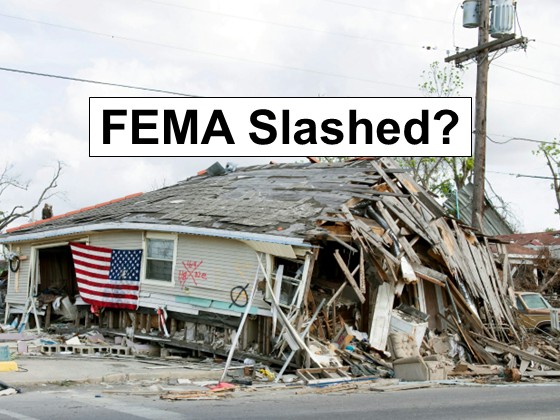With all the news about DOGE, tariffs, and whatever else is of interest to the mainstream media (MSM) the past few weeks, I hadn’t heard a word about Federal Emergency Management Agency (FEMA) being cut until I read this article.
It’s clear that the author has a bias against the cuts. One of the biggest changes, according to the author, is that disaster response will shift from the feds to the states. I instantly wondered if that was a truly bad thing or not. The author states:
“If it comes to pass, disaster response and recovery will be more chaotic and ineffective, endangering more lives—especially the elderly, youth, those who have disabilities and others with fewer resources to prepare or evacuate. States, even larger states, don’t have the resources to handle catastrophic disasters. In those cases, governors will ask for a presidentially declared disaster.”
Really? The latest hurricanes to hit the Carolina’s and Florida might suggest otherwise. I’ve yet to see a major disaster where FEMA swooped in to save the day. Time and again it’s been the local community who does the real work. But, hey, maybe there’s something to be said for top-down direction and federal disaster relief that comes after the worst has happened … you know, months after.
The article then goes on to talk about a “national resilience strategy,” which, from what I can tell, is merely a complaint about not focusing enough on climate change:
“In January 2025 the Biden administration released a National Resilience Strategy which was one of the many pieces of climate change resilience-related initiatives the Trump administration revoked. It’s hard to imagine a national resilience strategy that doesn’t address the climate crisis front and center.”
Fine. But should our primary federal disaster response organization be concerned with climate change? Maybe if you believe changes in climate directly impact disasters (either by increasing their numbers or affecting the amount of destruction) but there are a few scientists who say it’s not true. Unfortunately, the entirety of mainstream media state that climate change absolutely affects natural disasters, so there are few dissenters to listen to. Personally, I’m hesitant to believe what the MSM tells me to believe, especially when there’s a lot of money and power behind it.
The author continues with additional concerns over what “streamlining” means and it’s impact on the agency, there are continuing concerns over climate change, including calling it a “moral hazard” if climate change isn’t included in a new risk register, and perhaps a valid concern over how the federal government might support states in various aspects of recovery and mitigation efforts if it’s slashed to bits. But a moral hazard? Why exactly? Does the author not believe that people can take care of themselves? That local governments can’t step up?
I’m of the mind that the states should largely take care of their own safety and security, with very little input from federal agencies, so I’m not going to complain if FEMA plays less of a role in almost anything.
The author ends her piece by stating that:
“UCS will closely watch the outcomes of this executive order and this administration’s continued attacks on FEMA because it’s crucial that communities are protected and not sacrificed in the name of harmful and disingenuous efforts purported to advance “efficiency” and “streamline” the federal government’s response to disasters.”
I agree. People shouldn’t be “sacrificed” in the name of harmful efforts. If we’re going to cut, do it wisely. And most of all, ensure there are people in place who can fill the gaps at the state, county, or city level. This is where disaster repose efforts should largely reside, anyway. Again, it’s the local people who take care of themselves. They look out for each other. And it will be the locals who will step up when the time comes. This is what community is all about!
She continues…
“Genuine reforms to FEMA should be informed by science, expertise, and the experiences of disaster survivors. Instead, this administration seems hell-bent on a cruel campaign of decimating an agency that millions of people rely on to stay safe and get back on their feet after floods, fires, hurricanes and more.”
This author really doesn’t like change! Did I mention that she’s a “senior climate resilience policy analyst with the Climate & Energy program at the Union of Concerned Scientists?” That doesn’t make her biased, does it?
In any case, “hell-bent” on decimating FEMA might be a tad much. It might also be an overreaction to suggest that millions of people rely on FEMA to stay safe. I can’t recall the last time, if ever, that I cared what FEMA did or might do. Granted, if I were ever directly impacted by a disaster, one where I lost everything and truly needed help, I would be grateful for any help I’m given, even if it’s from a federal agency. But my guess is that it will be my neighbors, including the ones I’ve never met, who will offer me a hand up … and I will do the same.

Leave a Reply